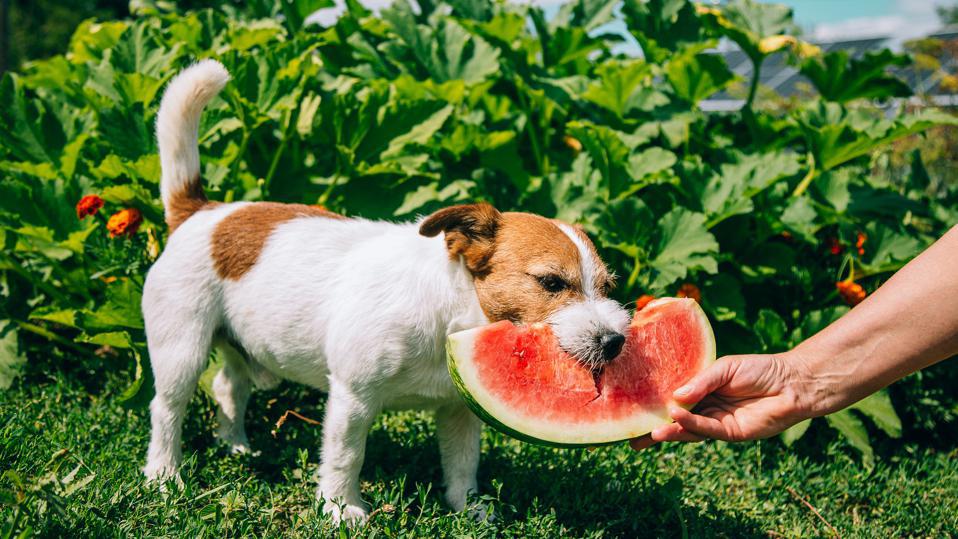Can Dogs Eat Watermelon A Tasty and Safe Summertime Treat!
In the world of canine cuisine, questions about what dogs can and cannot eat often arise. One such query that’s gained popularity among dog owners is, “Can dogs eat watermelon?” It’s a valid concern, considering that watermelon is a beloved summertime treat for humans. In this article, we’ll explore the safety and benefits of sharing this refreshing fruit with your furry companion.
Is Watermelon Safe for Dogs?
You might be wondering whether watermelon is a safe addition to your dog’s diet. The good news is that, in moderation, watermelon is generally safe for dogs. It’s a hydrating and low-calorie fruit that can be a delightful and healthy snack for your canine friend. However, like with any food, there are important considerations to keep in mind.

Benefits of Feeding Watermelon to Dogs
Before we dive into those considerations, let’s talk about the potential benefits of feeding watermelon to your dog. Watermelon is not only delicious but also nutritious. It’s packed with essential vitamins, such as A, B6, and C, as well as vital minerals like potassium. Additionally, watermelon has a high water content, making it an excellent choice for keeping your dog hydrated, especially during hot summer months.
Risks and Precautions
While watermelon can be a healthy treat for dogs, it’s essential to be aware of potential risks and take necessary precautions. One key concern is the presence of seeds and the tough rind. Watermelon seeds, if ingested in large quantities, can cause intestinal blockages. To avoid this, it’s recommended to either remove the seeds or choose seedless watermelon varieties. Additionally, the tough rind can be challenging for dogs to digest, so it’s best to remove it before offering the fruit.
How to Safely Feed Watermelon to Your Dog
Now that we’ve discussed the risks, let’s explore the safe way to introduce watermelon to your dog’s diet. Start by washing the watermelon thoroughly to remove any pesticides or dirt. Next, slice the fruit into small, bite-sized pieces. Remember to remove any seeds and the rind. These precautions help prevent choking hazards and digestive issues. As with any new food, introduce watermelon gradually to monitor your dog’s reaction.
Signs of Watermelon Allergies or Intolerance in Dogs
Just like humans, dogs can have food allergies or intolerances. While watermelon allergies are rare, it’s crucial to be vigilant for any adverse reactions. Signs of allergies or intolerance may include gastrointestinal upset (vomiting or diarrhea), itching, or skin irritation. If you notice any of these symptoms after your dog consumes watermelon, discontinue feeding it and consult your veterinarian.
Can Puppies Eat Watermelon?
Puppy owners often wonder if watermelon is suitable for their young companions. The answer is generally yes but with some caveats. Puppies can enjoy watermelon in moderation, just like adult dogs. However, it’s crucial to ensure the pieces are appropriately sized to avoid choking hazards. Additionally, when introducing new foods to a puppy’s diet, start slowly and monitor for any adverse reactions. Consult your veterinarian for specific guidance based on your puppy’s age and breed.
Watermelon Recipes for Dogs
Want to get creative with your dog’s treats? Consider making watermelon-based goodies. Here are a couple of simple recipes your pup may love:
Frozen Watermelon Cubes:
Cut watermelon into small cubes and freeze them for a refreshing and hydrating snack on hot days.
Watermelon Dog Treats:
Create homemade watermelon dog treats by blending watermelon chunks with plain yogurt, pouring the mixture into molds, and freezing until solid.
Alternatives to Watermelon
While watermelon is a fantastic treat, it’s not the only option for pampering your pup. Consider other dog-friendly fruits and vegetables like apples, blueberries, or carrots. These alternatives offer diverse flavors and nutrients to keep your dog’s diet interesting and well-balanced.
Frequently Asked Questions (FAQs) About Dogs and Watermelon
1. Can all dogs eat watermelon?
Generally, most dogs can safely enjoy watermelon in moderation. However, individual sensitivities may vary, so introduce it gradually and watch for any adverse reactions.
2. Are there any watermelon varieties to avoid?
Stick to seedless or deseeded watermelon to prevent choking hazards from seeds. Avoid watermelons with added sugar or artificial flavorings.
3. How much watermelon is safe to feed my dog?
A few small pieces or cubes of watermelon are usually safe. The key is moderation; excessive consumption can lead to digestive issues.
4. Can watermelon be a remedy for dehydration in dogs?
Watermelon has a high water content and can provide hydration, but it should not replace a dog’s regular water intake.
5. Are there watermelon-based dog foods available in the market?
Yes, some commercial dog foods and treats incorporate watermelon as an ingredient. Ensure they are specifically formulated for dogs.
6. Can watermelon help with a dog’s bad breath?
Watermelon’s natural sweetness might temporarily mask bad breath, but it’s not a long-term solution. Dental care is more effective.
7. What are the signs of watermelon intolerance in dogs?
Signs may include diarrhea, vomiting, or allergic reactions like itching or hives. If you notice these symptoms, discontinue watermelon.
8. Are there watermelon-flavored dog treats?
Yes, there are watermelon-flavored dog treats available. Ensure they are made with dog-safe ingredients and suitable for your pet’s size.
9. How can I store leftover watermelon for my dog?
Store leftover watermelon in an airtight container in the refrigerator. Avoid keeping it for too long to maintain freshness.
10. Can watermelon seeds harm my dog’s digestive system?
While a few seeds are unlikely to cause harm, it’s best to remove them to prevent choking or gastrointestinal issues. Seedless varieties are safer.
Conclusion:
In conclusion, the question, “Can dogs eat watermelon?” has a positive answer with certain precautions. Watermelon can be a healthy and hydrating addition to your dog’s diet when served in moderation and with proper preparation. Remember to remove seeds and the rind, and watch for any adverse reactions. If your dog enjoys the taste, it can be a delightful and nutritious treat, especially during warm weather.




